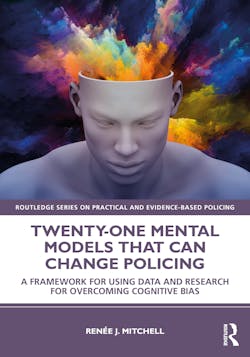Renée J. Mitchell in her newly released book, Twenty-One Mental Models That Can Change Policing: A Framework for Using Data and Research for Overcoming Cognitive Bias, defines mental models as “…a framework that takes a complex idea and boils it down to simplistic components.” Mitchell goes on to say, “There are mental models we construct in our minds based on our experience of the world and there are “known” Mental Models that have been verified by empirical data.”
What are Mental Models?
Charlie Munger of Berkshire Hathaway fame, while speaking at the USC business School in 1994, famously mentions the idea of mental models,
“Well, the first rule is that you can’t really know anything if you just remember isolated facts and try and bang ’em back. If the facts don’t hang together on a latticework of theory, you don’t have them in a usable form. You’ve got to have models in your head. And you’ve got to array your experience both vicarious and direct on this latticework of models. You may have noticed students who just try to remember and pound back what is remembered. Well, they fail in school and in life. You’ve got to hang experience on a latticework of models in your head.”
Here is an example of a mental model:
As Officer Muldoon drives her patrol car down a neighborhood street a flash catches her eye. It is speeding from the sidewalk to the street. Faster than Muldoon’s consciousness can recognize it, her foot hits the brake pedal. Thus, she did not hit a wayward cat. Officer Muldoon’s brain has created a mental model of “when-known-or-unknown-things-are-headed-towards-the-street-in-front-of-my car…HIT THE BRAKES.”
Our brains perform this instant reaction because it has created a latticework (mental model) of experiences you have had of things like dogs, balls, other cars, etc. moving into your path of travel periodically since you started driving. What if a block further down the street, an elephant walks out in front of Muldoon’s patrol car? She has never seen an elephant on the street before. Should Muldoon ponder on this situation for a while before telling her foot to stomp on the brakes?
Heck no!
Our previously discussed mental model of “when-known-or-unknown-things-are-headed-towards-the-street-in-front-of-my car…HIT THE BRAKES” is automatically put into motion. The mental model assists us in performing the correct action no matter the obstruction because we have created a conglomerate of many of our life experiences, most likely none with elephants, but specific to the general needs of the moment.
Cognitive Bias?
Now that we have the mental model part of the book's title defined, I bet you wonder what they have to do with overcoming cognitive biases.
Cognitive biases are defined by Mitchell as, “…rational deviations from logic…” Meaning we believe a thing because we have experienced something like it before. To better understand this, let’s go back to our obstruction-in-the-road scenario:
As Officer Muldoon drives her patrol car down a neighborhood street a flash catches your eye. It is speeding from the sidewalk to the street. Faster than her consciousness can recognize it, her foot hits the brake pedal. Coming to a stop, Muldoon sees an adult male, now in the middle of the road, raising a shotgun in line with her vehicle. Your brain created a mental model of, “when-known-or-unknown-things-are-headed-towards-the-street-in-front-of-my car…HIT THE BRAKES” that previously saved the cat, and the elephant, has now potentially put Officer Muldoon in harm's way.
Oops.
As you can see, our biases can be wrong. Just because it has always been a cat, or dog, or elephant that was the flash coming from the sidewalk in the past, does not mean it is always a “HIT THE BRAKES” moment. In like fashion, how often do we look at a collection of data, evidence, suspect, victim, or employee’s action and our biases gets in the way of the reality?
How This Book Can Help You Change Your Organization
21 Mental Models That Can Change Policing is written to assist the law enforcement professional in seeing through potential biases or make sure they aren’t in play when making decisions. These 21 specifically chosen, purposefully placed, and empirically proven mental models which can help thwart biases.
In this book the reader is guided along a path, building knowledge of mental models and how they work together as resources on how to make decisions and plan actions. Broken down into seven parts containing three matched mental models. At the end of each part is a “Practice Section.” These sections are overviews, practices, and resources tied to common law enforcement processes you probably see daily. The author details how the three previous models are best used under the circumstances of existing processes.
Part VIII, How to Apply it All, concludes the book. This section is an outline-styled collection of tools as an example of how all 21 models come together as “[o]ne method a police organization could take to evaluate and restructure their approach to crime reduction and cognitive bias”.
Conclusion
Renée J. Mitchell’s Twenty-One Mental Models That Can Change Policing: A Framework for Using Data and Research for Overcoming Cognitive Bias is part of the Routledge Series on Practical and Evidence-Based Policing. Scores of books, podcasts, and articles have been created concerning the need for improved mental models in the business world. Few encompass a “how-to” that is of value. Mitchell has done an excellent job of bringing these time-tested mental models together into an easy-to-understand path of knowledge and tools that apply directly to the Law Enforcement environment. I was very excited about this book when I saw it had been released and was quick to get my copy. This book is written predominantly for the administration side of an organization. But all 21 of the models detailed and described work within all levels of your organization. We all have biases.
About Renée J. Mitchell
Renée J. Mitchell is an expert in policing research with a professional background in law enforcement. As a 22-year member of the Sacramento Police Department, she served in patrol, detectives, recruiting, schools, and the Regional Transit System. In 2009-2010, she was a Fulbright Police Research Fellow, studying juvenile gang violence at the London Metropolitan Police Service. She is the co-founder of the American Society of Evidence-Based Policing and serves on its executive committee.
Dr. Mitchell joined RTI International in 2020 and is involved in several key policing research projects, including the National Institute of Justice Mass Shooting Project, Enhancing the Law Enforcement Response to Victims of Residential Burglaries, Estimating Sex Trafficking in Sacramento County, and Calls for Service Data as Integrator for Crisis Response. She is skilled in designing field experiments, conducting randomized controlled trials, and designing interventions for police patrols and police training. She is also interested in research on women in policing.
Dr. Mitchell is a member of the California State Bar, the American Society of Criminology, and the International Association of Crime Analysts.
~Click here to order your copy of Twenty-One Mental Models That Can Change Policing: A Framework for Using Data and Research for Overcoming Cognitive Bias on Amazon today.



